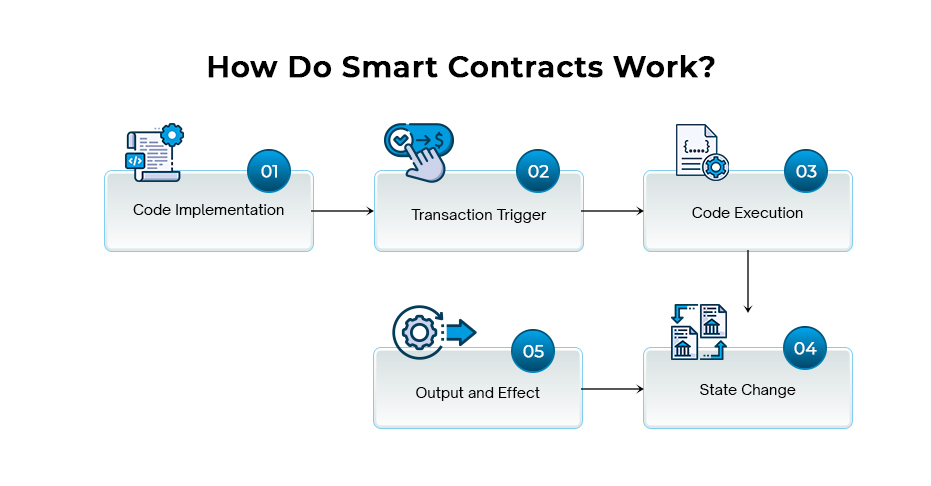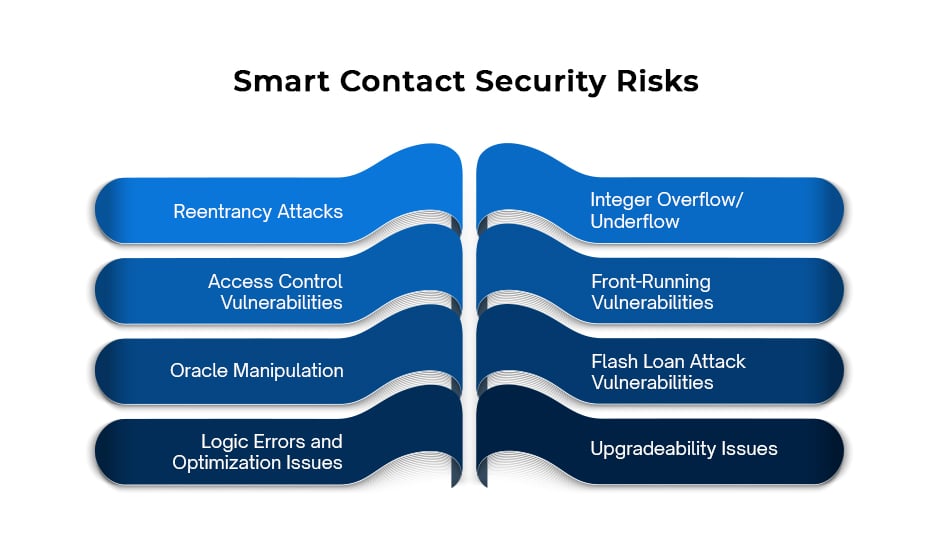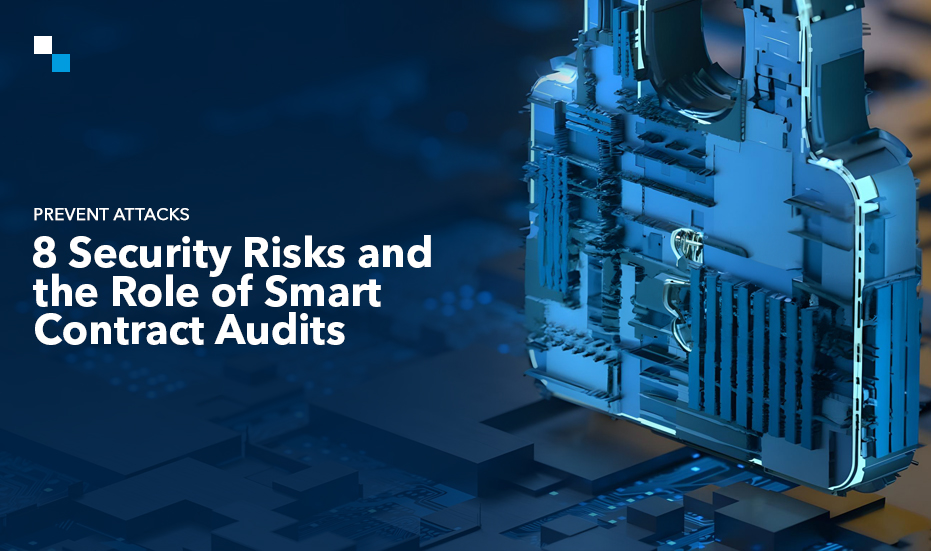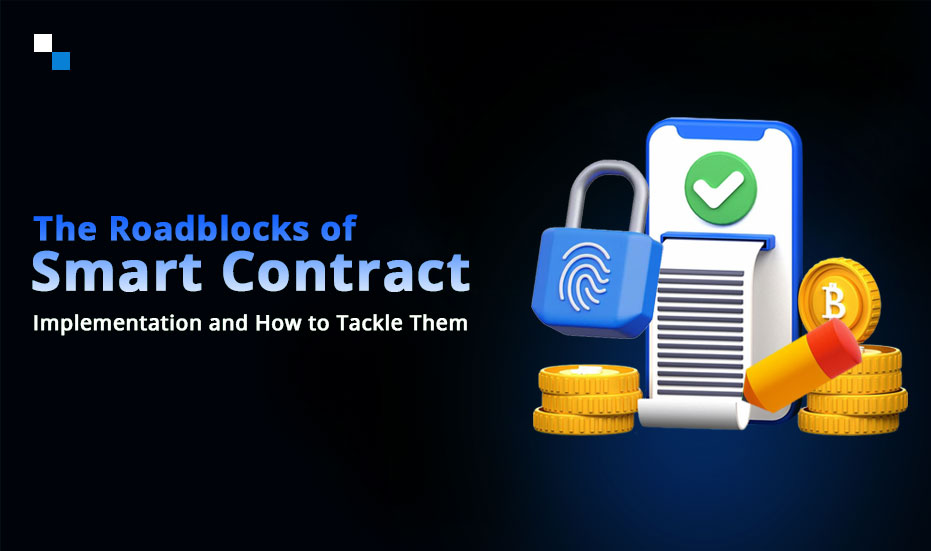
Building Crypto Trading Bots for Copy Trading: A Comprehensive Guide
November 7, 2024
Is DeFi Yield Farming More Profitable Than Liquidity Mining & Staking?
November 7, 2024Smart contracts are used for automating and enforcing agreements without involving intermediaries. However, poorly designed smart contracts or those with logic flaws can contain critical vulnerabilities. These might include inadequate validation checks, infinite loops, or other unintended logic behaviors that attackers can exploit to gain unauthorized access or extract funds.
Smart contract security audit services perform rigorous logic assessments to ensure the contract behaves as intended. Auditors meticulously test each function’s logic, validating input, outputs, and control flows to prevent vulnerabilities arising from flawed design.
Over 75% of DeFi Hacks are Due to Smart Contract Vulnerabilities
The Working Mechanism of Smart Contracts
These contracts are self-executing ones whose terms of the agreement are directly written into codes. They work on blockchain technology, guaranteeing transparency, security, and automation.

Before we discuss the benefits of smart contract audit, let’s understand their working mechanism:
- Code Implementation: Developers write the contract’s logic using a specific programming language, such as Solidity for Ethereum, and deploy to a blockchain network.
- Transaction Trigger: An event or condition that initiates the execution of the contract. This can be a payment on a specific date or time.
- Code Execution: The blockchain network verifies the transaction and executes the code according to the predefined rules.
- State Change: The contract’s state is updated to reflect the changes resulting from the execution. This update is recorded on the blockchain, making it immutable and transparent.
- Output and Effect: The contract may produce outputs, such as sending funds to specific addresses or triggering other actions. These actions are automatically executed, ensuring that the terms of the agreement are fulfilled.
Why Should You Consider Smart Contract Security Audit Services?
Key benefits of using smart contracts include:
- Automation: Automates processes, reducing the level of human error while increasing efficiency.
- Transparency: All transactions and codes on the blockchain are open; hence, it builds trust.
- Security: The product contains in-built security features and cryptographic techniques that ensure the product is protected from fraud and tampering.
- Immutability: The code cannot be changed after deployment, and the integrity of the contract is guaranteed.
- Efficiency: Smart contracts will execute complex agreements without the need for intermediaries.
Security Risks and the Ways to Mitigate Them
When conducting a smart contract audit, it is imperative to address the eight types of security risks that may compromise the integrity and functionality of the smart contract. Here are the best ways used by smart contract security audit services to overcome these risks:

1. Reentrancy Attacks
The Risk:
Reentrancy attacks occur when malicious contracts repeatedly call back into the target contract before the first execution completes, potentially draining funds through multiple withdrawals.
Audit Solutions:
Professional smart contract audit firms implement:
- Checks-Effects-Interactions pattern verification
- State variable updates before external calls
- Reentrancy guard implementation testing
- Cross-function reentrancy analysis
2. Integer Overflow/Underflow
The Risk:
Mathematical operations in smart contracts can exceed the maximum or minimum values of integer variables, leading to unexpected behaviours and potential exploits.
Audit Solutions:
- SafeMath library implementation verification
- Boundary condition testing
- Mathematical operation flow analysis
- Input validation checks
- Overflow protection mechanisms review
3. Access Control Vulnerabilities
The Risk:
Improper access control mechanisms can allow unauthorized users to execute privileged functions or access sensitive contract features.
Audit Solutions:
A thorough smart contract audit includes:
- Role-based access control verification
- Permission hierarchy analysis
- Function modifier testing
- Administrative function security
- Emergency control mechanism assessment
4. Front-Running Vulnerabilities
The Risk:
Malicious actors can observe pending transactions and insert their own transactions ahead, profiting from known future state changes.
Audit Solutions:
- Transaction ordering dependency analysis
- Timestamp manipulation checks
- Proper sequencing verification
- MEV protection implementation review
- Time-lock mechanism assessment
5. Oracle Manipulation
The Risk:
Smart contracts relying on external data feeds can be compromised if oracle data is manipulated or becomes unavailable.
Audit Solutions:
Smart contract security audit services focus on:
- Oracle implementation review
- Data feed redundancy checks
- Failure mode analysis
- Price deviation controls
- Timestamp validation
- Multiple oracle integration verification
6. Flash Loan Attack Vulnerabilities
The Risk:
Uncollateralized loans can be used to manipulate market prices and exploit poorly designed DeFi protocols.
Audit Solutions:
- Price manipulation resistance testing
- Liquidity pool security analysis
- Collateral validation mechanisms
- Market manipulation scenario testing
- Flash loan attack simulations
7. Logic Errors and Optimization Issues
The Risk:
Flawed business logic or inefficient code can lead to unexpected behaviours or excessive gas consumption.
Audit Solutions:
Professional audits include:
- Business logic verification
- Gas optimization analysis
- Code efficiency review
- Function call flow analysis
- Error handling assessment
- Edge case testing
8. Upgradeability Issues
The Risk:
Upgradeable contracts can introduce vulnerabilities through improper implementation or malicious upgrades.
Audit Solutions:
- Upgrade mechanism security review
- Storage layout analysis
- Proxy pattern implementation check
- State migration verification
- Access control for upgrades

The Smart Contract Audit Process
Although, it is highly recommended to seek smart contract security audit services instead of doing a self-assessment, still, you must be aware of the procedure of auditing. Keep reading to understand the basic steps.
1. Initial Assessment
- Code review setup
- Scope definition
- Documentation analysis
- Architecture review
- Previous audit findings analysis
2. Automated Testing
- Static analysis tools
- Dynamic analysis
- Symbolic execution
- Fuzzing tests
- Coverage analysis
3. Manual Review
- Line-by-line code review
- Business logic analysis
- Security pattern verification
- Best practice compliance
- Gas optimization review
4. Reporting and Remediation
- Vulnerability classification
- Risk assessment
- Mitigation recommendations
- Code improvement suggestions
- Follow-up verification
Best Practices for Security
Ready for smart contract audit? Learn about the right way of doing it:
1. Pre-Audit Preparation:
- Comprehensive documentation
- Clean code organization
- Test coverage
- Known vulnerability checks
- Gas optimization
2. During Audit:
- Active communication with auditors
- Quick response to queries
- Issue tracking
- Fix verification
- Documentation updates
3. Post-Audit Actions
- Implementation of recommendations
- Re-testing of fixed issues
- Continuous monitoring
- Regular security updates
- Community disclosure
The Role of Continuous Security
Smart contract security isn’t a one-time event. Continuous security measures include:
1. Regular Audits
- Periodic code reviews
- Update assessments
- New vulnerability checks
- Performance optimization
- Compliance verification
2. Monitoring and Response
- Real-time monitoring
- Incident response planning
- Bug bounty programs
- Community feedback
- Security updates
Conclusion
Choosing the right smart contract audit company is a necessity as it ensures your blockchain-powered application is secure & reliable and behaves as intended. Professional auditors will help identify the vulnerabilities related to reentrancy attacks, integer overflows, and improper access controls, which can ultimately lead to financial disasters and reputational damage as well.
Antier’s comprehensive smart contract security audit services include code analysis, testing, and reporting in detail. Our experts work vigorously to check each contract against any potential weakness to maximize its performance while ensuring absolute transparency.
Gear up to handle the intense competition in this blockchain industry. Let’s do it together!



